Bob Kurzu was a talented utility player for the University of Florida football team from 1979 to 1984, playing running back, tight end, and special teams. He was known as a loving husband to his wife Laura Kurzu and a fun-loving father to his two children. In his early-50’s, Kurzu began experiencing cognitive decline and became uncharacteristically aggressive and impulsive. He passed away on September 26, 2020 at age 59. After his death, researchers from the UNITE Brain Bank diagnosed him with stage 3 CTE. Laura wrote a letter to her 25-year-old self about the joys of marriage with Bob and how symptoms of CTE derailed his life and their family.
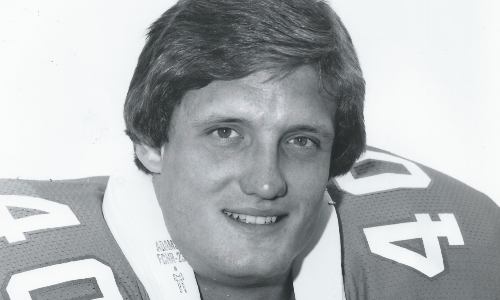
Dear 25-year-old me,
You have just embarked upon your professional career, but you are impatient to find true love. Typical you. Wanting all the answers, you accompany some friends to a well-known futurist in Chicago to see if you can learn what your life will hold for you. The seer spends more time with you than with your friends, says you are powerful and strong, and reveals you will have a fantastic career. When you ask about love, she shares you will marry the love of your life – a man with the initials BK who is your intellectual equal, who is also powerful and strong, a gifted athlete and a bit of a cowboy. She promises you will have two beautiful children and a magical, happy life together. When you inquire if you will be married forever, her face clouds and she simply responds that she sees lots of confusion; she sees your handsome husband in a daze and walking alone along his property line.
She could tell me no more, but it was all true.
It takes another four years for Bob Kurzu, Mr. BK, to walk into your life and steal your heart. You’ve just moved to New York and are on a blind date in Little Italy with a group of people when the most handsome man you have ever seen walks into the restaurant, with a blonde on each arm. Immediately you disregard him as “just another pretty face” – until later you learn he had been unceremoniously dumped by a woman who was seated at your table, and he wanted to make an entrance. It doesn’t take long for you to realize this is a funny, kind, and self-deprecating man.
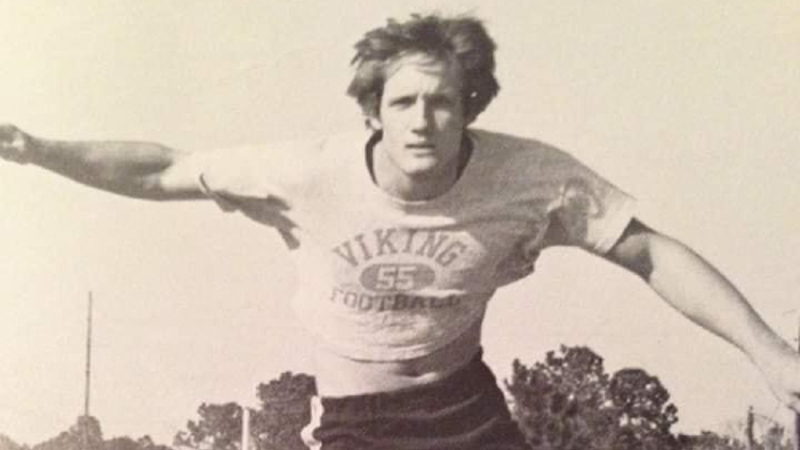
Later, when you are set up to go on a date with Bob, you begin to appreciate his extraordinary intellect and accomplishments. You discover he is a former scholarship athlete – a football player for the University of Florida. But more impressively he is a business manager for the Howard Hughes Medical Institute where he supports several Nobel Laureates and their scientific discovery at Columbia University, Rockefeller University, and NYU.
Beautiful and brilliant.
Whirlwind romance doesn’t even come close to describing your courtship. You’ve never been so in sync with anyone before on virtually every topic. You spend late nights just talking about different theoretical scenarios and brainstorming ideas. You fall deeply in love with his mind. He views football as a violent game of chess and loves to explain the strategy. He is a problem-solver and a self-described “fixer” who relishes the challenge of a seemingly unsolvable task. No one has ever been able to make you laugh as much as Bob. Your family and friends all love him – some even more than they love you. Every morning you pinch yourself.
He proposes six months later, and you are married exactly one year from that first date, just a few weeks after your 30th birthday.
Soon after your dream wedding, you make the decision to relocate from New York to St. Louis so Bob can get his MBA at Washington University. He has dedicated his career to “the greater good” serving to advance scientific discovery by supporting medical research scientists and has secured a position at Washington University Medical School supporting the Department of Molecular Biology and Pharmacology. It’s not long before you experience some traumatic trials – your dear brother has a freak accident resulting in a coma and head injury, and Bob’s father has some serious health issues including congestive heart failure at a very young age. The two of you face these challenges together and become even stronger as a couple because of these experiences. You are rock-solid.

You start a family.
After being married for two years, you are blessed with a perfect baby girl who has the uncanny ability to increase your capacity for love in a way you never imagined. Sarah is the absolute center of your world, and life has never been better. Nearly two years later, your son Jack is born, and your family is complete.
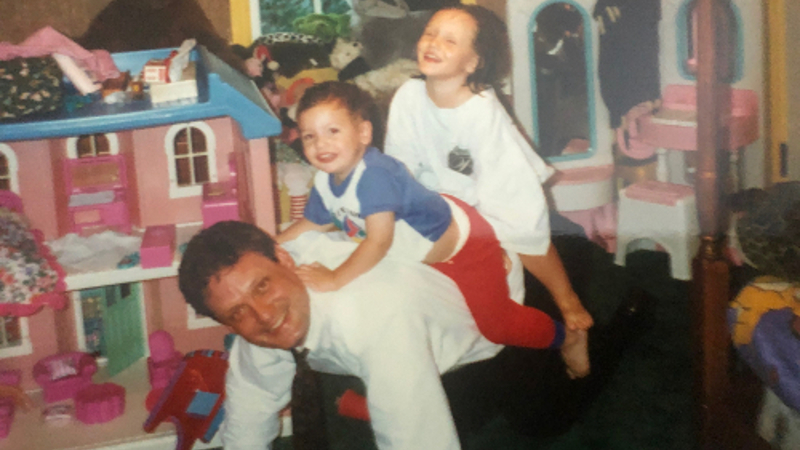
To say Bob is a great dad is a huge understatement. The kids are the center of his life, and he is a thoughtful and creative caregiver. He has “cowboy dinners” where he serves baby snakes (sliced hot dogs) and rattle snake eggs (beans) on tin plates (pie pans) outdoors. He takes the kids fishing and cooks up their “catch” (Mrs. Paul’s fish sticks). He gathers all the kids in the neighborhood to form an inclusive gang – and when they discover an elderly widow has a birthday alone, he has the gang throw her a party and a parade. I tell you all this because Bob Kurzu was so focused on others and creating meaningful, thoughtful, and purposeful experiences. He loves to surprise you with extravagant and romantic gestures.
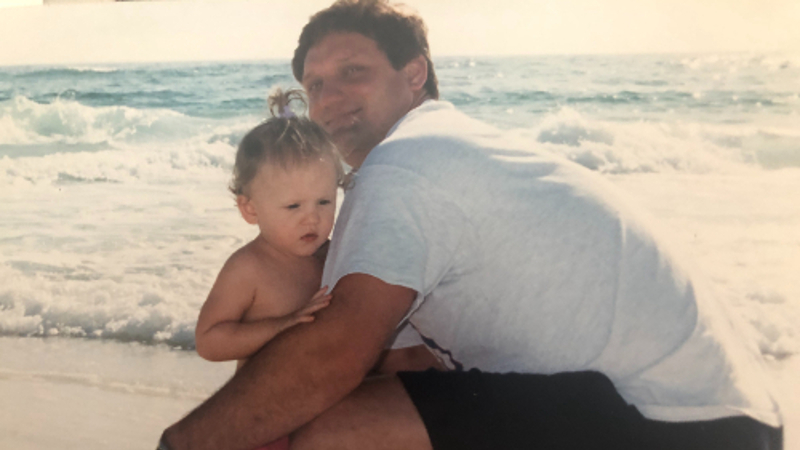
Life is perfect…
You and Bob have amazing friends and an active social life. You love throwing parties and hosting game night. Fantasy football is a big focus of the fall and winter seasons, and often conversations will turn to Bob’s football days. Some of his funniest stories include the many times when he had concussions and did silly antics as a result – like the time he did a dance on the sidelines to prove to his coach he still had the moves to play, or when he introduced himself to his father because his bell was rung so badly, he did not recognize his own dad. Football is a big part of his identity and a point of pride for him and your family. The kids are huge Gator fans. You all go to St. Louis Rams games, and to two Super Bowls, and even watch the Gators win the National Championship.
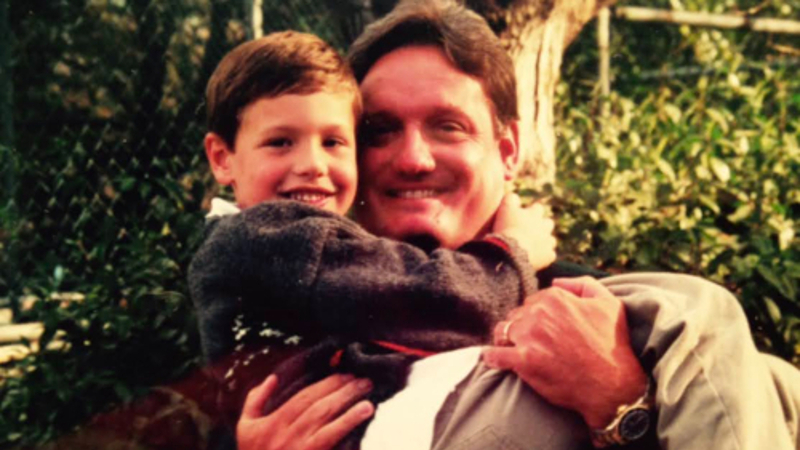
Alcohol – especially beer – is always around and consumed quite a bit, but Bob is never drunk or out of control. Alcohol being a problem will never really cross your mind, even though you see the black Hefty trash bag full of empties after a weekend and know you did not drink any…
Around age 15, Sarah finds her athleticism and begins to excel at the sport of crew. She’s good. Really good. Recruiters take notice and it looks like she will be a D1 scholarship athlete. Jack is very big for his age and has loads of potential but is still developing. Eventually he will be a D1 football scholarship athlete, too. The three of them together conspire to create an exclusive “D1 Club” where you are not allowed to join. There is so much to be proud of. Life is so good…
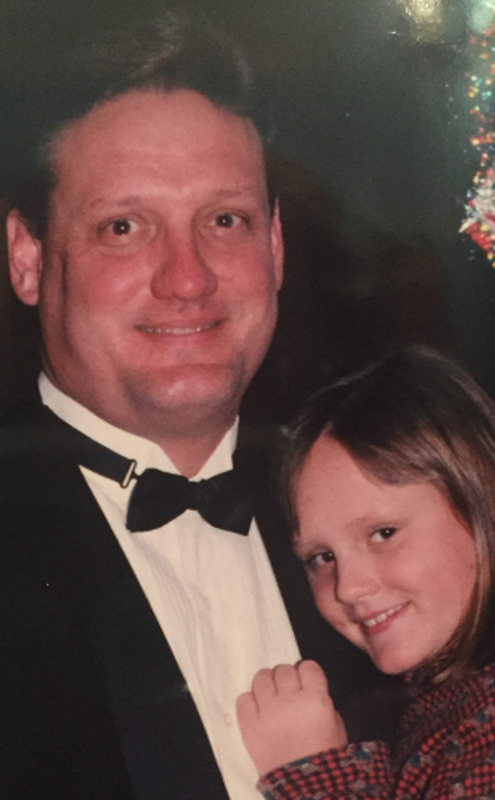
…Until it isn’t.
So, knowing you, you are tapping your toes and getting impatient to learn what went wrong, especially if everything is so perfect.
It’s hard to pinpoint when the changes begin, but there are lots of little signals which in isolation seem so unimportant, but collectively your family life begins to unravel.
First, the drinking. It escalates with Bob to be almost constant. He allows you to drive so he can drink responsibly. He sleeps a lot. He even loses the job he loves due to drinking during the workday. This comes as a shock to you – but even more shocking is Bob’s insistence that he is doing nothing wrong. His behavior is normal in his mind – it’s the rest of us who have the problem.
Then comes the confusion. The man who once did regression analysis by hand to better his fantasy football odds now has trouble navigating simple websites or search engines. He gets lost while driving and misplaces items frequently.
Next, Bob’s writing and grammar degenerates. Always a point of pride, his language suddenly is noticeably peppered with double negatives, incomplete sentences, and typos.
His memory deteriorates and with it his ability to phrase grant projects for his work. To cope, Bob starts hoarding printed documents that he can turn to and copy from rather than draft new proposals. The solution is a chaotic system of massive stacks of papers in his study, reflective of a disordered mind.
His frustration leads to uncharacteristic and frequent outbursts of anger. He does not understand simple concepts – which makes Bob confused and paranoid. He will make wild accusations and even question your fidelity. He soothes his insecurity with alcohol.
He becomes surly and withdraws from his friends and his family. He uses work or exhaustion from work as an excuse to miss important events – the kid’s athletic competitions or their prom pictures. Soon, he can’t go anywhere without drinking. It’s a problem. A big one. And everyone is suffering.
So what do you do? You ignore it, hoping it will all go away.
How can the man who is the love of your life suddenly become unrecognizable? It’s incongruent with what you know the character and heart of Bob to be. He’s lying. He’s not taking responsibility. He’s mean. He says you are frigid and you are smothering the kids and not allowing them to grow up.
Bob is not the only one who is confused. Everyone is. His boss, co-workers, his children, close friends, and you. The most insidious thing? For the most part he appears to be normal to almost everyone but you and the kids. And then you discover he’s using you and the kids as excuses for his actions, blaming you all for his behaviors.
You feel so alone. There’s no one, really, who you can talk to who can empathize or understand this seismic shift in your husband and homelife. You’ve always been a private person, so even your closest friends don’t really know what you are dealing with. You become an expert on alcoholism and learn terms like “dry drunk” and “denial,” but something still doesn’t add up. This does not fit with the person whom you know your husband to be.
The breaking point.
Your daughter begs you to act. Her life has become intolerable as she is the one who calls Bob on his bad behavior. Your son is losing his confidence as Bob targets and compares Jack’s developing athleticism to his own former prowess. The once-happy home is now riddled with secrets and festering with the pressure to keep up appearances.
After many years of pleading with Bob to go to counseling, or to stop drinking, you finally draw the line when your daughter suffers from an eating disorder that threatens her life. Bob cannot or will not provide her with the support she needs. The verbal abuse escalates to him physically attacking you over the kids or your coldness towards him. You feel perplexed as to how you can be loving to this stranger.
Bob is now drinking a bottle of vodka or more a day. As a last resort, you take Bob to see a neuro specialist at Wash U Medical School who also happens to work with suspected Chronic Traumatic Encephalopathy (CTE) patients. Bob is tested, and the results are not conclusive. The good news? He does not have schizophrenia or Alzheimer’s. The bad news? He is decidedly an alcoholic. The worse news? You will not know if he has CTE unless his brain is donated to science posthumously.
On your birthday, you ask him to leave, and he does.
You’ve been married 23 years, and 20 have been perfect but the past three have been hell. Bob stopped working, and you are the sole wage-earner to support your family.
Bob will not go to rehab but attempts to stop drinking on his own. He sees visions – mostly angels and demons. He believes you are the devil and says he sees you have cloven hooves where your feet should be. He hears voices, and you become fearful for your safety, so you begin locking yourself in your room. One night, he bangs on your door to get in. You hear him walking away and then the lights in the entire house go off as he cuts the circuit breaker. You hear him whistling in the dark and walking back toward your room, hitting something in his hand which you later discover to be a hammer. Terrified, you call 9-1-1, and the police come. They confront him, and he agrees to leave. You cannot believe this is even happening. You pack his bags and tell him he needs to get help or you will divorce him. But either way, he can’t come back unless he changes.
Laura, I wish I could tell you this has a happy ending to match the fairy tale beginning. I’d love to tell you that was the end of the trauma and the violence, but it wasn’t. You suffer. Sarah suffers. Jack suffers. There is so much pain that cannot be taken away. But there is also tremendous growth, and your faith in God sustains you even during your darkest times.
After 25 years of marriage, you decide to divorce Bob. It’s the hardest decision you have ever made because he was and is the love of your life, and there is overwhelming guilt at breaking your vows… “for better or worse, in sickness and in health.” When this happens, please forgive yourself.
You try to help your children come to terms with the trauma of their childhood and you commit yourself to being there for them every step of the way. You pray for Bob and try to keep the door open but, when necessary, use all your strength to bolt it shut to protect your children from his toxic behavior. You see the hope in their eyes darken when he goes to rehab but checks out early or when he refuses to follow a program. He is no longer superman, and it’s hard to watch.
With death comes closure.
Arguably, Bob seems to have a death wish. His health declines due to his drinking, and despite warnings from his doctors, he will not or cannot stop. The man who held a seat at the table with the most brilliant minds in science now can’t hold down a job at the Dollar Store. He spends his last days confused and angry. He dies at the age of 59 in a small, low-rent apartment in his hometown where he once had been a football hero. The scumbags whom he lets into his life rob his apartment while his dead body is still on the bed, taking what little legacy he has left – his Florida Gator bowl rings and his Rolex watch.
You get the call from a dear friend who tells you the news – and are horrified at your reaction of relief that it’s over. This monster can no longer torment your children or you. And then the awful guilt sets in – what kind of monster does that make you? You are happy someone you adore has died such a lonely death?
And so, you go into full-on Momma Bear mode. You must steer yourself to tell your children that their father, whom they have been estranged from, whom they once idolized, whom they still hope to reconcile with, has left this earth. You feel their pain as if it’s your own, and you grieve both the lost years past and those years that will now never be.
You encourage your kids to mourn the loss by focusing on the man he was rather than the thing he had become. You travel to stand by their side and help wherever you can. You have relinquished your rights to be a grieving widow, although that is how you feel. When you attend the wake in the small town where he was a local legend, a huge surprise awaits. You are welcomed with open arms by long-lost friends and family. They show real love and empathy and desire to reconnect with you and your children to celebrate the Bob Kurzu we all loved so well.
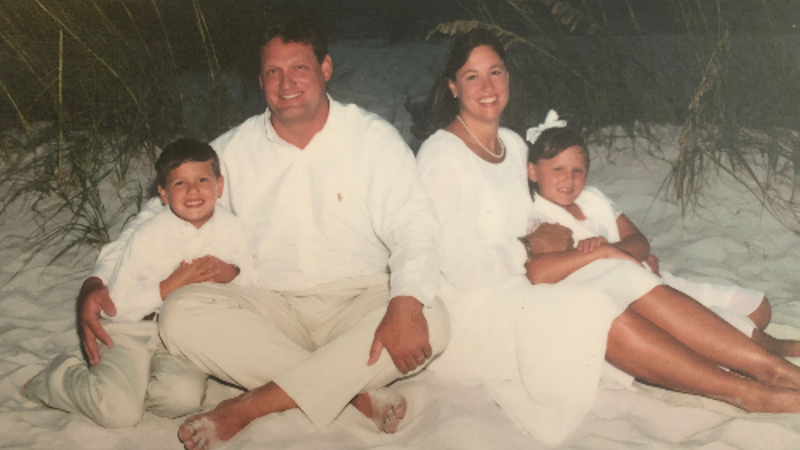
Your heart swells with pride as your kids speak so eloquently at the funeral. They openly acknowledge the alcoholism but focus on the man they knew to be the real Bob Kurzu: the dad who made cowboy dinners. This opens the opportunity to have real dialogue about what his true friends had witnessed and the love he expressed to them about his kids – but also the confusion and addiction he struggled with. No more secrets.
You and the kids donate Bob’s brain to the UNITE Brain Bank where it will be studied for CTE research. There is solace in knowing the man who had dedicated his life to advancing science would be once again helping scientific discovery with his donation.
Finally, something you can feel good about hating.
When you finally learn of Bob’s diagnosis, it’s as if the world shifts back into place and you are no longer in the upside-down. The cause of the inexplicable changes in his cognitive, physical, and emotional behavior now has a name – Chronic Traumatic Encephalopathy, a progressive brain condition caused by repetitive head trauma.
While he most certainly was an alcoholic, it now makes sense that Bob’s drive to drink was to numb the pain and deal with the confusion caused by his progressively addled brain. The timeline of your life is now marked as “before CTE” or “after CTE” – and there is tremendous comfort in the realization that this was not something Bob could choose or control.
In the diagnosis review, the scientist tells you and the kids three things that are all incredibly helpful and equally heartbreaking:
- There was nothing any of you could do to prevent this.
- There was nothing any of you could do to stop this.
- There was nothing any of you could do to change this.
You focus on the memories of happier times and allow yourself to mourn the loss of the incredible man you loved so dearly – who was not the person who walked this earth over the past several years in a confused state of mind.
You allow yourself to remember details long forgotten, including a strange argument Bob and you had while on your honeymoon – where he says out of the blue, “You know if we had kids and it was ever a choice between saving the kids or you, I would save the kids, right?” Your response is something like, “Well, that makes zero sense because I am young and can have more kids, so the logical choice would be to save me.” (Remember, you have not had kids yet and have no maternal instincts).
What happens next is almost prophetic. Bob is adamant and makes you swear if you ever need to choose, you will save the kids versus him. You try to laugh it off, but he holds your shoulders, looks deeply into your eyes, and you make a vow.
And, years later when it comes time, you keep your word; you save the kids. Now you know in your heart without a doubt it’s what the man you loved would have insisted you do. You saved the kids from what CTE had made him. The kids know the story, and they both agree. You are all finally at peace.
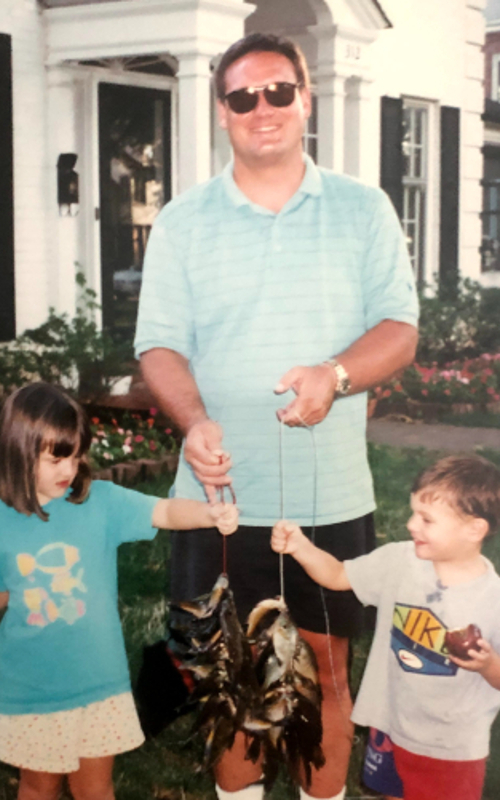
xoxo
Epilogue
This personal essay was written as part of a research project. The intent of a “letter to their former self” is to use hindsight to reflect on the personal experience of what the loved ones of those who have CTE have experienced, and with this hindsight, what advice they’d give to their former self or to others who are going through a similar situation.
At the time of my husband’s change, information about CTE was very limited, and what information did exist was largely associated with those who played professional football. In my husband’s case, he only played at the collegiate level and most of his concussions we know about happened during high school, so it was not top of mind for CTE to be the culprit. We believed the only other diagnosis that made sense – he was an alcoholic.
I think the hardest thing for my journey was the confusion I experienced during my husband’s metamorphosis and descent. I could not reconcile the man that I knew so well with this person who was the exact opposite in nearly every aspect, including his core beliefs. I held onto the hope that he would change or eventually hit bottom and get help. But unlike alcoholism, with CTE there is currently no recovery.
The advice I would offer to families going through a similar situation is to gather as much information as you can about CTE – and then to be prepared to protect yourself and leave if you are in an unsafe situation.
I pray that donating my husband’s brain will help with the development of diagnostic tools that can enable families to achieve an accurate assessment of their own situation so that they can make the best plan for their loved ones.
If you feel you or someone you know is at risk of intimate partner violence, please call the National Domestic Violence Hotline at 1-800-799-SAFE (7233) or text ‘START’ to 88788.

